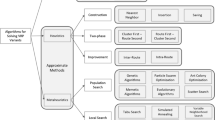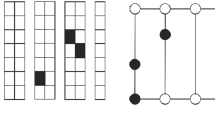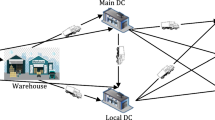Abstract
In this paper, we formulate a practical solid transportation problem with product blending which is a common issue in many operational and planning models in the chemical, petroleum, gasoline and process industries. In the problem formulation, we consider that raw materials from different sources with different quality (or purity) levels are to be transported to some destinations so that the materials received at each destination can be blended together into the final product to meet minimum quality requirement of that destination. The parameters such as transportation costs, availabilities, demands are considered as rough variables in designing the model. We construct a rough chance-constrained programming (RCCP) model for the problem with rough parameters based on trust measure. This RCCP model is then transformed into deterministic form to solve the problem. Numerical example is presented to illustrate the problem model and solution strategy. The results are obtained using the standard optimization solver LINGO.

Similar content being viewed by others
References
Chanas S, Kuchta D (1996) A concept of the optimal solution of the transportation problem with fuzzy cost coefficients. Fuzzy Sets Syst 82:299–305
DeWitt C, Lasdon L, Waren A, Brenner D, Melhem S (1989) OMEGA—an improved gasoline blending system for Texaco. Interfaces 19(1):85–101
Haley KB (1962) The sold transportation problem. Oper Res 10:448–463
Hitchcoockk FL (1941) The distribution of product from several sources to numerous localities. J Math Phys 20:224–230
Jiménez F, Verdegay JL (1998) Uncertain solid transportation problems. Fuzzy Sets Syst 100:45–57
Jiménez F, Verdegay JL (1999) Solving fuzzy solid transportation problems by an evolutionary algorithm based parametric approach. Eur J Oper Res 117:485–510
Kaur A, Kumar A (2012) A new approach for solving fuzzy transportation problems using generalized trapezoidal fuzzy numbers. Appl Soft Comput 12(3):1201–1213
Kelly JD, Mann JL (2003) Crude oil blend scheduling optimization: an application with multimillion dollar benefits. Hydrocarb Process 82(6):47–53
Kundu P, Kar S, Maiti M (2013a) Multi-objective multi-item solid transportation problem in fuzzy environment. Appl Math Model 37:2028–2038
Kundu P, Kar S, Maiti M (2013b) Some solid transportation models with crisp and rough costs. Int J Math Comput Phys Electr Comput Eng 73:185–192
Kundu P, Kar S, Maiti M (2014) Multi-objective solid transportation problems with budget constraint in uncertain environment. Int J Syst Sci 45(8):1668–1682
Liu B (2002) Theory and practice of uncertain programming. Physica-Verlag, Heidelberg
Liu B (2003) Inequalities and convergence concepts of fuzzy and rough variables. Fuzzy Opt Decis Mak 2:87–100
Liu B (2004) Uncertainty theory: an introduction to its axiomatic foundations. Springer, Berlin
Liu B, Iwamura K (1998) Chance constrained programming with fuzzy parameters. Fuzzy Sets Syst 94(2):227–237
Liu L, Zhu Y (2007) Rough variables with values in measurable spaces. Inf Sci 177:4678–4685
Liu S (2006) Fuzzy total transportation cost measures for fuzzy solid transportation problem. Appl Math Comput 174:927–941
Méndez CA, Grossmann IE, Harjunkoski I, Kaboré P (2006) A simultaneous optimization approach for off-line blending and scheduling of oil-refinery operations. Comput Chem Eng 30:614–634
Misener R, Floudas CA (2009) Advances for the pooling problem: modeling, global optimization, and computational studies survey. Appl Comput Math 8(1):3–22
Mondal M, Maity AK, Maiti MK, Maiti M (2013) A production-repairing inventory model with fuzzy rough coefficients under inflation and time value of money. Appl Math Model 37:3200–3215
Nagarjan A, Jeyaraman K (2010) Solution of chance constrained programming problem for multi-objective interval solid transportation problem under stochastic environment using fuzzy approach. Int J Comput Appl 10(9):19–29
Ojha A, Das B, Mondal S, Maity M (2009) An entropy based solid transportation problem for general fuzzy costs and time with fuzzy equality. Math Comput Model 50(1–2):166–178
Papageorgiou DJ, Toriello A, Nemhauser GL, Savelsbergh MWP (2012) Fixed-charge transportation with product blending. Transp Sci 46(2):281–295
Pawlak Z (1982) Rough sets. Int J Inf Comput Sci 11(5):341–356
Pawlak Z (1991) Rough sets—theoretical aspects of reasoning about data. Kluwer Academatic Publishers, Boston
Pawlak Z, Skowron A (2007) Rough sets: some extensions. Inf Sci 177:28–40
Polkowski L (2002) Rough sets, mathematical foundations. Physica-Verlag, Heidelberg
Rigby B, Lasdon L, Waren A (1995) The evolution of Texaco’s blending systems: from OMEGA to StarBlend. Interfaces 25(5):64–83
Romo F, Tomasgar A, Hellemo L, Fodstad M, Eidesen BH, Pedersen B (2009) Optimizing the Norwegian natural gas production and transport. Interfaces 39(1):46–56
Tao Z, Xu J (2012) A class of rough multiple objective programming and its application to solid transportation problem. Inf Sci 188:215–235
Xu J, Yao L (2010) A class of two-person zero-sum matrix games with rough payoffs. Int J Math Math Sci. doi:10.1155/2010/404792
Xu J, Li B, Wu D (2009) Rough data envelopment analysis and its application to supply chain performance evaluation. Int J Prod Econ 122:628–638
Yang L, Feng Y (2007) A bicriteria solid transportation problem with fixed charge under stochastic environment. Appl Math Model 31:2668–2683
Yang L, Liu L (2007) Fuzzy fixed charge solid transportation problem and algorithm. Appl Soft Comput 7:879–889
Youness E (2006) Characterizing solutions of rough programming problems. Eur J Oper Res 168:1019–1029
Acknowledgments
Pradip Kundu sincerely acknowledges the support received from IISER Kolkata to carry out this research work.
Author information
Authors and Affiliations
Corresponding author
Ethics declarations
Conflict of interest
None.
Additional information
Communicated by V. Loia.
Rights and permissions
About this article
Cite this article
Kundu, P., Kar, M.B., Kar, S. et al. A solid transportation model with product blending and parameters as rough variables. Soft Comput 21, 2297–2306 (2017). https://doi.org/10.1007/s00500-015-1941-9
Published:
Issue Date:
DOI: https://doi.org/10.1007/s00500-015-1941-9




